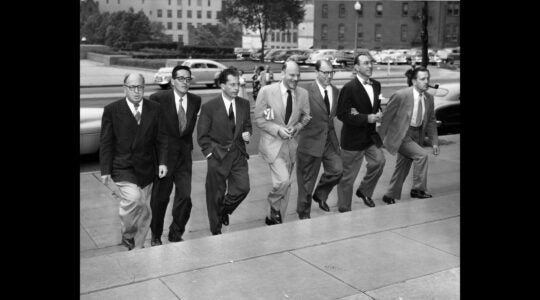Chabad in the Himalayas. Chabad in Vietnam. Chabad in Alaska.
Chabad emissaries are renowned for their ability to adapt to any arena, and in a world that’s increasingly digital-only, one Chabad rabbi is bringing Judaism online to a new cause and community.
Enter Michael Caras, who calls himself The Bitcoin Rabbi.
The original and most common of the many digital monies, or cryptocur-rencies, now circulating on the internet, bitcoin was invented by an anonymous programmer known only as Satoshi Nakamoto. Since its introduction in 2009, it has garnered a devoted user base that sees bitcoin as the future of money.
A very real Chabad rabbi and bitcoin enthusiast, Rabbi Caras has a regular job at a day school in Albany. But the rest of the time, he’s an active presence in the cryptocurrency community, appearing on podcasts, giving interviews to websites and speaking from his Twitter pulpit about the similarities between Judaism and this strange new digital form of money (He’s not urging anyone to invest in bitcoin, and stressed that he doesn’t represent Chabad in any official capacity in this endeavor.)
“I give my little Twitter messages, my little dvar Torahs,” Rabbi Caras said, speaking by phone with The Jewish Week. “I try and make connections with the parshah … and be both a good example and helpful wherever I can in both of my expertises.”
Rabbi Caras sees himself as a “two-way ambassador,” teaching non-Jews about Judaism, and Jews about bitcoin. But of all the things for a Chabad rabbi to be enthusiastic about, why this?
“I’ve always been, ever since I was a kid … interested in technology, and I just like the way that technology makes our lives simpler and easier,” he said. “So the first time I understood what bitcoin is, it hit me very hard and I became very excited and kind of jumped really quickly into this whole ecosystem.”
As the rabbi describes it, bitcoin and its underlying technology, the blockchain, is like a digital spreadsheet that keeps track of how much money people have. There’s no central bank of bitcoin or government that regulates the currency, manipulates it or causes inflation (making a currency worth less) by “printing” more bitcoin.
As the currency was born out of the 2008-09 economic collapse, the theory of bitcoin revolves around keeping monetary value stable over time — an idea Rabbi Caras sees rooted in Judaism.
“Inflation is inherently immoral and unfair to people, like the idea of devaluing money,” he explained. “There is a mitzvah in the Torah to have fair weights. And what is a fair weight? People think about weighing grains or weighing objects, but really, if you go back, what you were weighing a lot of the time was the coins and the metal to make sure that those coins weren’t being devalued.”
Rabbi Caras also sees bitcoin, in light of Jewish history, as a way to gain freedom from persecution as well as inflation. With no central authority, no one can take your money, he said.
“As a Jew, my family fled from Eastern Europe, and they fled with whatever was in their pockets and a suitcase or a bag that they brought with them,” he said. But his family, like many refugees, had to leave many of their belongings behind — or had them confiscated.
“The idea of being able to escape oppressive governments is something that, even if you live in America … you can appreciate the concept that your money is yours, and it doesn’t belong to the government.”
Rabbi Caras is quick to caution, though, that his Jewish-bitcoin analogies shouldn’t be taken as gospel. The Torah never mentions bitcoin, and he finds connecting the two to be more “cute” than anything.
But his faith in bitcoin is real enough that he wrote a children’s book about the digital currency to explain what it is and why people should be using it. He’s even raised enough funds to send over 350 copies of the book, titled “Bitcoin Money,” about the fictional town of Bitville learning to use different currencies, to elected officials in Congress.
And ultimately, it’s the Jewish authorities’ attention that the rabbi wants to capture, to help shape the future of a digital halacha, or Jewish law.
“There is so much halacha that is missing, that is not clear and that is what I’m hoping will develop,” Rabbi Caras said. “I’m waiting for the first bitcoin Rav [halachic expert] to appear.”
The New York Jewish Week brings you the stories behind the headlines, keeping you connected to Jewish life in New York. Help sustain the reporting you trust by donating today.




